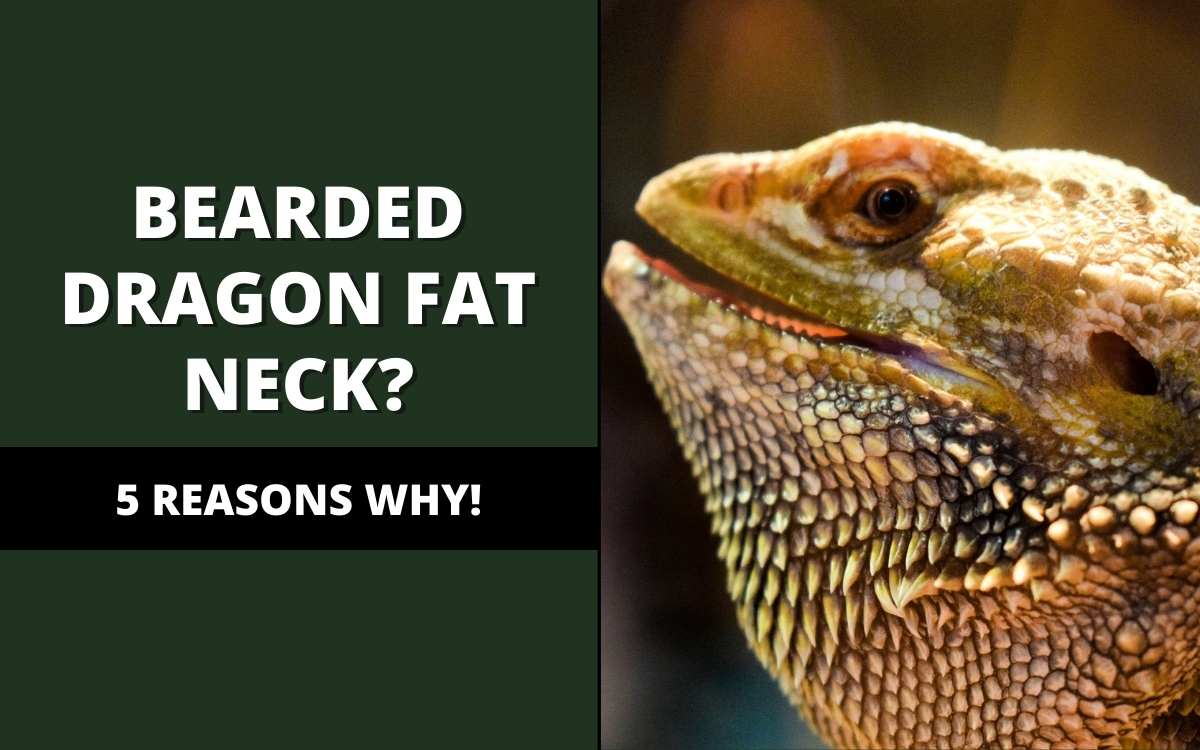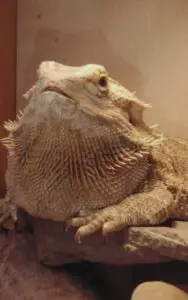Disclaimer: As an Amazon Associate I earn from qualifying purchases. Therefore, we may collect a share of sales from the links on this page, at no extra cost to you!

Does your bearded dragon have a fat neck? If so, should you be concerned?
It’s always a good idea to keep a close eye on your bearded dragon. Certain health issues may arise and it’s better to react ASAP before the issue worsens.
Oftentimes, bearded dragons don’t show obvious signs of illness until it’s too late. Therefore, it’s crucial to keep up with their behavior, pooping, diet, and more.
So, let’s get back to our original question – if my bearded dragon has a fat neck, what does it mean? Is it a cause for concern?
A bearded dragon with a fat neck is typically temporary. When a bearded dragon feels threatened, it will puff up its neck as a defense mechanism. This makes the bearded dragon appear larger in the presence of a predator. However, there are times when a fat neck could indicate a health issue.
Keep reading to learn more about the various reasons why your bearded dragon has a fat neck and if it’s a health issue, how you can treat it at home!
Jump to..
1. Abscess or Infection
If your bearded dragon has a skinny belly and a disproportionately fat neck, it may be a sign that your beardie is suffering from an infection or abscess.
We recommend examining the neck of your bearded dragon to ensure it’s proportionate. Also, it’s a good idea to gently rub the neck to check for any lumps or deformities.
Furthermore, if your bearded dragons’ neck is stiff or hard to the touch, it may be a sign of an infection.
If your bearded dragon is suffering from an infection, the best product that you can self-administer is REPTAID Immune Support. This product directly targets bacteria that cause infection, parasites, and other contaminates.
You can also give it to your beardie on a weekly basis to strengthen their immune system. I’ve been doing this for years and my bearded dragons haven’t had any health issues since.
You can learn more or purchase REPTAID Immune Support here:
If your bearded dragon is also lethargic, not moving, having diarrhea, and showing other signs of illness, you should seek the care of a reptile veterinarian as soon as possible.
2. They’re Storing Fat
Interestingly, bearded dragons store fat in their necks. Similar to how people store fat in their bellies or hips, the neck is one of the primary areas that beardies store their fat.
Furthermore, beardies are able to store food in their neck area as well.
This is largely the reason why bearded dragons are able to consume so much food at one time.
It’s not uncommon for a bearded dragon to consume 30-40 crickets in a single sitting. A lot of these crickets are going straight into the neck area and will soon digest and process in the stomach.
3. Your Bearded Dragon is Overweight
Like we discussed earlier, bearded dragons tend to store fat in their necks. As a result, the neck tends to naturally be a fatty area of the body.
However, if your bearded dragons neck is insalubriously fat, it may be a sign that your bearded dragon needs to cut back on their weight.
Here’s an example of a bearded dragon that is overweight:

If you’re worried your bearded dragon is overweight, we recommend checking out our beardie care guide to learn more about how to properly feed your beardie.
4. Lack of UVB Lighting or Supplementation
Needless to say, UVB lighting and calcium are essential to the development of a bearded dragon.
Without these essentials, your bearded dragon can develop deformities, especially regarding bone development.
In some cases, a bearded dragon will develop a fat neck due to lack of proper husbandry practices.
If you aren’t changing your UVB lights out and regularly dusting your crickets with calcium, your beardie can develop a number of health issues.
If you’re worried that your bearded dragon is suffering due to a lack of supplementation or UVB, it’s strongly advised that you correct the issue and seek a veterinarian for further assistance.
Here’s the UVB light that we use for our beardies:
Here’s the calcium supplement that we use for our beardies (with Vitamin D3!):
5. Your Bearded Dragon is Shedding
Another common reason your bearded dragon has a fat neck is because they’re shedding.
Oftentimes, when a bearded dragon begins to shed, their neck appears to grow larger.
However, this is simply an illusion. Whenever the skin separates from their body, it gives off the impression that the neck is larger than it actually is.
Before jumping to any conclusions, make sure your bearded dragon has completed its shed.
6. They Feel Threatened
Again, circling back to our original point – a bearded dragon will puff up its beard and neck when it feels threatened.
Of course, this is temporary and your bearded dragon will likely only display this behavior when you’re in their presence.
Additional signs that your bearded dragon feels threatened include their beard turning black, hissing, or a stiffened body.
If this is the reason your bearded dragons neck is fat, it’s probably a sign that you need to spend more time handling your beardie. A bearded dragon that isn’t handled regularly will likely become afraid of human interaction over time. Building a bond with your beardie is super important and will make the experience of owning one that much better!
Bearded Dragon Fat Neck? Normal or Not?
In summary, if your bearded dragon has a fat neck, it’s typically not a cause for concern.
Bearded dragons store fat in their necks and it will oftentimes look chubby compared to the rest of their body.
However, if your beardie has lumps or an uneven neck, it may be a good idea to seek professional help.
Last but not least, we hope you learned something new from this article. If you have any more questions regarding proper bearded dragon husbandry, feel free to browse our site or leave a comment down below.
As always – Stay safe and Happy Herping!
